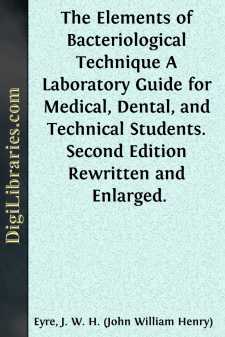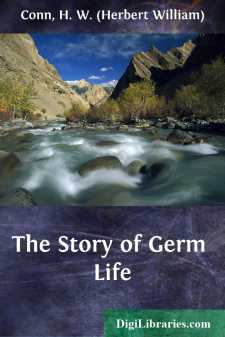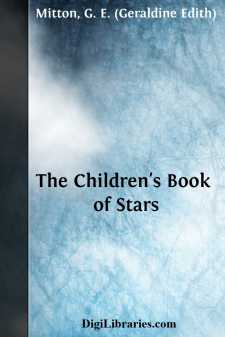Science
- Astronomy 18
- Biology 40
- Chemistry 13
- Electricity 1
- General 38
- History 6
- Light 1
- Paleontology 2
- Philosophy & Social Aspects 1
- Physics 3
- Relativity 2
- Study & Teaching 1
- Waves & Wave Mechanics 1
Science Books
Sort by:
by:
Henry P. Talbot
PART I INTRODUCTION SUBDIVISIONS OF ANALYTICAL CHEMISTRY A complete chemical analysis of a body of unknown composition involves the recognition of its component parts by the methods of !qualitative analysis!, and the determination of the proportions in which these components are present by the processes of !quantitative analysis!. A preliminary qualitative examination is generally indispensable, if...
more...
by:
Robert Boyle
INTRODUCTORY To the following Treatise. O give the Reader an account, Why the following Treatise is suffer’d to pass abroad so maim’d and imperfect, I must inform him that ’tis now long since, that to gratify an ingenious Gentleman, I set down some of the Reasons that kept me from fully acquiescing either in the Peripatetical, or in the Chymical Doctrine, of the Material Principles of mixt Bodies....
more...
In venturing to offer to the public, and more particularly to the female sex, an Introduction to Chemistry, the author, herself a woman, conceives that some explanation may be required; and she feels it the more necessary to apologise for the present undertaking, as her knowledge of the subject is but recent, and as she can have no real claims to the title of chemist. On attending for the first time...
more...
by:
William Crookes
THE CHEMICAL HISTORY OF A CANDLE LECTURE I. A CANDLE: THE FLAME—ITS SOURCES—STRUCTURE—MOBILITY—BRIGHTNESS. I purpose, in return for the honour you do us by coming to see what are our proceedings here, to bring before you, in the course of these lectures, the Chemical History of a Candle. I have taken this subject on a former occasion; and were it left to my own will, I should prefer to repeat...
more...
by:
Justus Liebig
LETTER I My dear Sir, The influence which the science of chemistry exercises upon human industry, agriculture, and commerce; upon physiology, medicine, and other sciences, is now so interesting a topic of conversation everywhere, that it may be no unacceptable present to you if I trace in a few familiar letters some of the relations it bears to these various sciences, and exhibit for you its actual...
more...
PREFACE In offering this book to teachers of elementary chemistry the authors lay no claim to any great originality. It has been their aim to prepare a text-book constructed along lines which have become recognized as best suited to an elementary treatment of the subject. At the same time they have made a consistent effort to make the text clear in outline, simple in style and language, conservatively...
more...
In the year 1884 I was invited to give tuition by correspondence, in Biology. Although disposed at the time to ridicule the idea of imparting instruction in natural science by letter, I gladly accepted the opportunity thus afforded me of ascertaining for myself what could and could not be accomplished in that direction. Anyone familiar with the scope of biological enquiry, and the methods of biological...
more...
I. LABORATORY REGULATIONS. The following regulations are laid down for observance in the Bacteriological Laboratories under the direction of the author. Similar regulations should be enforced in all laboratories where pathogenic bacteria are studied. Guy's Hospital. BACTERIOLOGICAL DEPARTMENT. HANDLING OF INFECTIVE MATERIALS. The following Regulations have been drawn up in the interest of those...
more...
CHAPTER I. BACTERIA AS PLANTS. During the last fifteen years the subject of bacteriology [Footnote: The term microbe is simply a word which has been coined to include all of the microscopic plants commonly included under the terms bacteria and yeasts.] has developed with a marvellous rapidity. At the beginning of the ninth decade of the century bacteria were scarcely heard of outside of scientific...
more...
CHAPTER I THE EARTH It is a curious fact that when we are used to things, we often do not notice them, and things which we do every day cease to attract our attention. We find an instance of this in the curious change that comes over objects the further they are removed from us. They grow smaller and smaller, so that at a distance a grown-up person looks no larger than a doll; and a short stick planted...
more...











